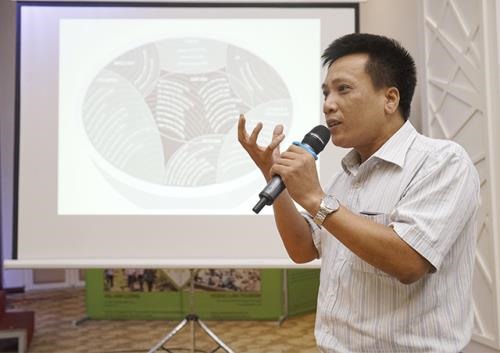 Opinion
Opinion

Dr Trần Toàn Thắng, deputy director of the Research Department on Business Environment and Competition, under the Central Institute for Economic Management speaks to BNEWs/Viêt Nam News Agency about green growth in Việt Nam/
 |
Dr Trần Toàn Thắng, deputy director of the Research Department on Business Environment and Competition, under the Central Institute for Economic Management speaks to BNEWs/Viêt Nam News Agency about green growth in Việt Nam
What are the challenges and opportunities that Việt Nam faces in achieving sustainable development in the context of climate change and environmental pollution?
The biggest advantage that Việt Nam enjoys is that it is a late comer and can learn from the most advanced science and technology and apply it in our country.
We have also enjoyed support from international communities and donors to help Việt Nam overcome the consequences of climate change and the impacts of greenhouse effects. Additionally, the Vietnamese government has adopted clear directions and policies on how to bets use natural resources while protecting the environment.
We can’t ignore the fact that the pressure for sustainable development is increasing and changing things at both micro and macro levels. On the other hand, the awareness of the public and enterprises about environmental protection has increased considerably.
To achieve sustainable development and a good balance between economy, environment and society is not easy. Economy, environment and society form a triangle, in which economic development must not be at the detriment of environment and natural resources or society.
Vice versa, to solve social and environmental issues, we must consider the economic interests of various parties.
Economic experts say that to achieve a green economy, the Government should adopt policies encouraging enterprises to invest in scientific research. What is your opinion?
For green growth, the government should encourage enterprises to use energy efficient methods, apply good technical procedures and advanced technology in production.
When the green growth movement was launched, many enterprises had already tried to cut down on production costs and maximise their benefits.
According to the Ministry of Science and Technology, the State budget has covered from 65-70 per cent of the cost for science and technology activities in Việt Nam. Meanwhile, in Japan and South Korea, enterprises themselves foot the majority of this bill. Investment capital from the State should be considered “seed capital” only in basic science and technology development or in areas with potential risks.
In my opinion, we should eliminate the mechanism of “ask and give”. In addition, administrative procedures to request government funding should be simplified and all enterprises should establish their innovation funds and use the funds according to State budget rules.
The other point I want to raise is the need to encourage enterprises to invest in developing technology. A recent survey showed that up to 85 percent of enterprises said that institutional reforms and the improved business environment existed only on paper, not in reality.
This indicates that enterprises lack confidence in business stability and the reform of business institution. These are the main things stopping them from investing in science and technology. In addition, enterprises don’t have long term confidence in investing in science and technology. They opt for short term opportunities. This is something for the government to think about and devise more appropriate policies.
Does the Government have any policy to attract investment in high tech projects and in clean production?
We have many laws on investment attraction in high tech projects and clean production. The Investment Law, the Enterprises Law, the Enterprises Income Law and others have special provisions that give preferential policies for enterprises that invest in hi-tech or projects friendly to the environment.
For example, the Ministry of Industry and Trade (MOIT) will soon come up with policies to encourage projects producing renewable energy. The MOIT also plans to establish a fund for sustainable energy development.
In addition, Việt Nam has begun to implement some free trade agreements. As a result, import taxes for equipment for the production of renewable energy will be reduced.
I’m sure that environmental awareness of central and local Governments as well as enterprises will be raised following the environmental incidents that occurred in 2016.
The use of renewable energy is considered a strategic step in consolidating economic efficiency and strengthening energy security and environmental protection. Do you have any ideas to encourage the use of renewable energy?
All these issues have been covered in the National Strategy on Renewal Energy in 2015. The task now is bringing the strategy to life.
As I have mentioned above, there are core challenges in economic and technical issues which will lead to the switch between objectives. For example, cost subsidisations for producing renewable energy while cutting direct subsidisation costs for thermal power production.
In addition, the Ministry of Finance is in the process of drafting a decision to double environmental taxes on petrol and diesel.
However, in my opinion, the most important point is that we improve the investment environment and institutions. To do that the Government should come up with long term and unified policies to make the enterprises feel at ease when investing in renewable energy._ VNS




